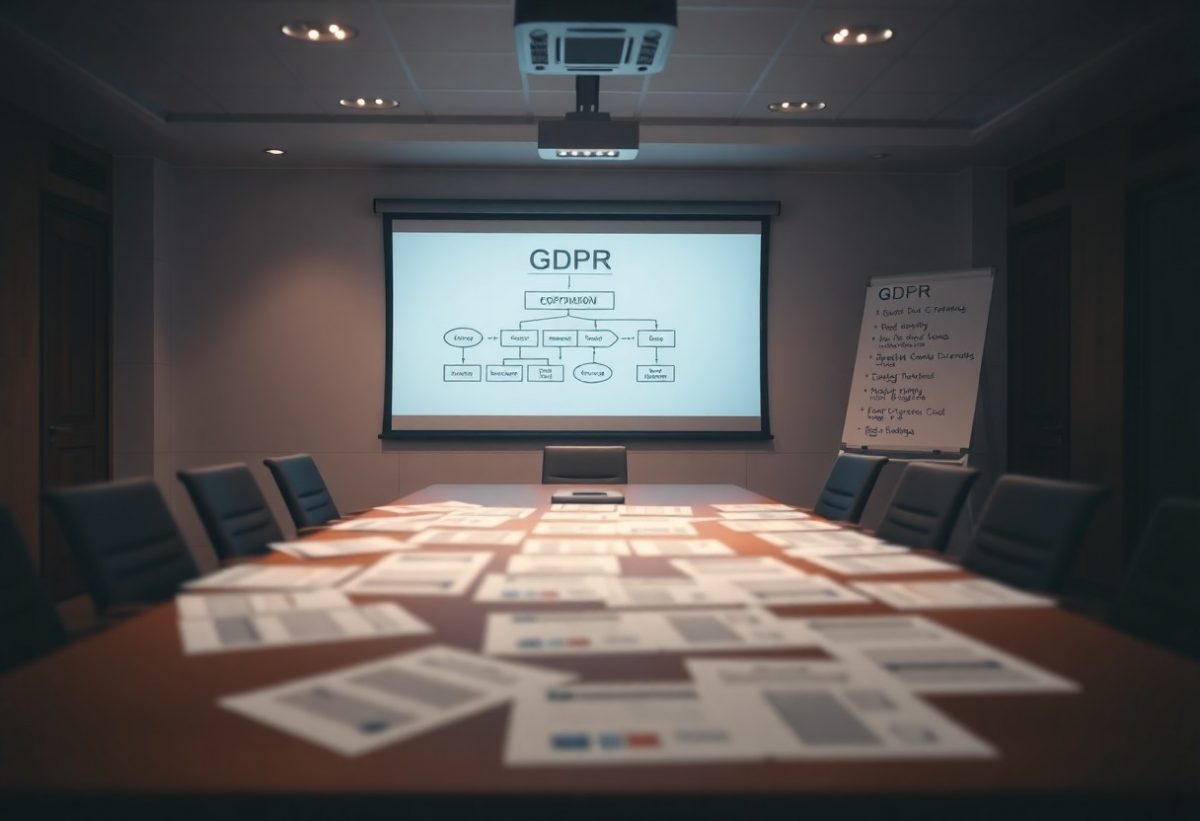You need to understand the GDPR rules that govern how online course businesses handle personal data. Compliance with these regulations is not just a legal obligation; it also builds trust with your customers. This guide will walk you through the vital requirements you must meet to protect student data, ensure privacy, and enhance your business’s credibility in the digital landscape. By following these guidelines, you can manage your online course business effectively while respecting the rights of your users.

Key Takeaways:
- Obtain explicit consent from users before collecting personal data.
- Ensure transparency by providing clear privacy notices outlining data usage.
- Implement strong security measures to protect user data from breaches.
- Allow users the right to access, modify, or delete their personal data.
- Designate a Data Protection Officer (DPO) if necessary for compliance oversight.

Understanding GDPR
Overview of GDPR
The General Data Protection Regulation (GDPR) is a comprehensive legal framework designed to protect the privacy and personal data of individuals in the European Union (EU). Implemented in May 2018, it applies to any organization that processes the personal data of EU residents, regardless of the organization’s location. This regulation emphasizes transparency, accountability, and the rights of individuals, allowing them greater control over their personal information.
Key Principles of GDPR
GDPR is built on several key principles that dictate how personal data should be handled. These principles include data processing transparency, purpose limitation, data minimization, accuracy, storage limitation, integrity and confidentiality, and accountability. Organizations must ensure compliance with these principles to protect individuals’ rights effectively.
Each principle plays a significant role in data protection. For instance, the principle of transparency obligates you to inform users about how their data is collected and used, while purpose limitation ensures data is only used for specified purposes you have communicated. Data minimization requires you to collect only the data necessary for your course delivery, and accuracy mandates that you keep this data up-to-date. This holistic approach fosters trust and compliance, imperative for your online course business.
Scope of GDPR in Online Businesses
GDPR applies broadly to all online businesses that handle personal data of EU residents. This includes educational platforms, course management systems, and even email marketing services. Your business, regardless of its physical location, falls under GDPR’s jurisdiction if it targets or collects data from users in the EU.
This expansive scope means that if your online course business operates in or markets to the EU, you must adhere to GDPR regulations. For example, if you collect users’ names, contact information, or payment details, those pages need to comply with GDPR standards, ensuring that you handle and secure this data appropriately. Non-compliance can result in hefty fines, emphasizing the importance of understanding and implementing GDPR in your operations.
Data Protection Requirements for Online Course Businesses
Types of Personal Data Collected
You may collect various types of personal data from your online course participants. This data can include:
- Names
- Email addresses
- Phone numbers
- Payment information
- Course preferences
The collection of this information is important for providing a personalized learning experience.
| Name | Used for identification and communication. |
| Email Address | Used for course updates and marketing. |
| Phone Number | Used for account recovery and support. |
| Payment Information | Used to process course fees. |
| Course Preferences | Used to tailor course recommendations. |
Lawful Bases for Processing Data
You must have a lawful basis for processing personal data under GDPR. This includes consent, performance of a contract, legal obligations, vital interests, public tasks, or legitimate interests.
Consent is the most common basis in online education, where you obtain explicit permission from users before collecting their data. If you’re processing data for contract performance, your course agreements must clearly outline terms. Understanding these bases helps you ensure your data handling practices comply with GDPR requirements.
Data Minimization Principle
You should adhere to the data minimization principle by only collecting data that is necessary for your course operations. This principle encourages you to limit the data you gather to what is important.
Collecting excessive information can expose you to risk and is not aligned with GDPR principles. An example includes only gathering necessary information during registration, such as name and email, and avoiding unnecessary data like demographic factors unless directly pertinent to the course’s effectiveness.
Consent Mechanisms
Implement clear consent mechanisms that inform users about their data processing and enable them to give explicit permission. This practice builds trust and ensures compliance.
Your consent forms should be straightforward, using clear language and not pre-checked boxes. Users must understand what they are consenting to, including how their data will be used and stored. Regularly reviewing your consent mechanisms ensures continuity with regulatory updates and user rights.
Rights of Users
Right to Access Data
You have the right to request access to your personal data held by the online course provider. This means you can inquire about what information is being collected, how it is used, and who it is being shared with. Providers must respond to your request within one month and provide a copy of your data free of charge, ensuring transparency in their data handling practices.
Right to Rectification
If you find that your personal data is inaccurate or incomplete, you have the right to request rectification. This allows you to ensure that the information held about you is correct and up to date, promoting accountability in how your data is managed.
When you invoke the right to rectification, the online course provider must make the necessary corrections within one month of your request. However, if your request is complex, they may extend this period to two months. It’s important to provide clear evidence supporting your claim to facilitate the correction process effectively.
Right to Erasure
You can request the deletion of your personal data under certain conditions, effectively enabling you to exercise control over your information. This right is often referred to as the “right to be forgotten” and must be fulfilled by the provider unless there are compelling legal reasons to retain it.
When you invoke the right to erasure, the online course provider must assess your request against their legal obligations and any guidelines that justify keeping your data. If they cannot validate a reason to retain your information, they have an obligation to delete it promptly, ensuring that your digital footprint is minimized if you choose to withdraw consent.
Right to Portability
You have the right to receive your personal data in a structured, commonly used, and machine-readable format. This enables you to transfer your data between service providers without hindrance, enhancing your freedom of choice regarding online courses.
Utilizing the right to portability means you can easily switch platforms or courses, keeping your data intact and manageable. The provider must provide your data in a format that can be easily utilized by other systems, promoting user empowerment and seamless transitions between educational services.
Right to Objection
When you raise an objection, the online course provider is obliged to stop processing your personal data unless they can demonstrate compelling legitimate grounds that override your interests. This reinforces your authority over your information and ensures that your data is not utilized against your wishes, providing a layer of protection in data management practices.
Transparency and Communication
Privacy Notices
Providing a clear and comprehensive privacy notice is necessary for your online course business. It should articulate what personal data you collect, how you use it, and the legal grounds for processing. A well-structured privacy notice increases trust and clarity, ensuring that users know their rights and how they are protected under GDPR.
User Consent Forms
Utilizing user consent forms is vital for obtaining explicit permission for processing personal data. These forms should clearly outline the purpose of data collection and ensure users understand what they are consenting to. Consent must be given freely, and users should have the option to withdraw it at any time.
Effective user consent forms not only fulfill legal requirements but also enhance user engagement by establishing transparency. Consider utilizing toggle options for different types of data collection, enabling users to tailor their consent preferences. Clearly worded explanations ensure users comprehend what they agree to, fostering a sense of empowerment and security.
Information on Data Processing
You are required to inform users about how their data is processed, including details on storage, sharing, and retention periods. This information should be readily accessible and updated regularly to maintain compliance with GDPR guidelines.
Detailing your data processing activities demonstrates your commitment to transparency. You might provide examples of third-party services used for processing, such as payment gateways or email marketing platforms. Specify retention periods for data to clarify how long personal information is stored, ensuring users feel secure knowing their data is not kept longer than necessary.
Data Security Measures
Ensuring Data Protection by Design
Incorporating data protection by design means embedding privacy considerations into your online course systems from the outset. This approach prioritizes user privacy, ensuring that only the necessary personal data is collected and processed, minimizing risks from the beginning of your course development. For example, using anonymous data when possible helps protect learner identities while still providing valuable insights.
Implementing Technical and Organizational Measures
Establishing robust technical and organizational measures is necessary for safeguarding personal data. These can include encryption, access controls, and regular security audits to ensure data integrity and confidentiality. You should also foster a culture of data protection within your organization by training your staff on best practices.
For effective implementation, consider adopting end-to-end encryption for data storage and transmission, alongside access protocols that limit data access to authorized personnel only. Regularly updating your IT infrastructure and conducting vulnerability assessments strengthen your defenses against data breaches. Engaging third-party security experts can also provide invaluable insights into enhancing security measures.
Handling Data Breaches
In the unfortunate event of a data breach, it’s vital you have a well-defined response plan in place. This process should include immediate actions to contain the breach, notification protocols for affected individuals, and reporting procedures to the relevant authorities within the required 72-hour timeline. Transparent communications will also help maintain trust with your learners.
A comprehensive incident response plan will detail steps such as identifying the breach source, securing affected systems, and assessing the impact on personal data. Performing a thorough investigation post-breach not only helps in compliance but can also provide insights for improving future data protection strategies. Engaging cybersecurity professionals during a breach can further enhance response effectiveness and help protect against future incidents.
Compliance and Accountability
Appointing a Data Protection Officer (DPO)
Depending on the size and nature of your online course business, appointing a Data Protection Officer (DPO) may be necessary. The DPO ensures compliance with GDPR regulations, oversees data processing activities, and serves as a point of contact for data subjects and the supervisory authority. This role helps maintain accountability and builds trust with your learners by demonstrating a commitment to data protection.
Conducting Data Protection Impact Assessments (DPIAs)
Conducting Data Protection Impact Assessments (DPIAs) is important for identifying and mitigating risks related to personal data processing. DPIAs help you assess the necessity and proportionality of your data processing activities, ensuring compliance with GDPR requirements.
A DPIA should be conducted when initiating new projects or changes that might impact data privacy. For example, if you introduce a new online platform or tool that collects user data, assessing the potential risks to data subjects will help you implement safeguards early on. This proactive approach not only minimizes legal risks but also enhances your organization’s credibility and accountability in handling personal data.
Maintaining Records of Processing Activities
Maintaining records of processing activities is a key requirement under GDPR, ensuring transparency and accountability. You must document the types of personal data you collect, the purposes of processing, and data retention periods.
Keeping detailed records helps you demonstrate compliance during audits and inspections. For instance, maintaining a data inventory that outlines every aspect of data handling—like collection methods, purposes, and third-party sharing—allows you to efficiently answer any inquiries from data protection authorities and reinforces your responsibility in managing personal data effectively.
Employee Training and Awareness
Employee training and awareness about GDPR is vital for fostering a culture of data protection within your organization. Regular training sessions will equip your team with the necessary knowledge on data handling, security measures, and the importance of compliance.
Implementing a robust training program can minimize risks associated with data breaches or non-compliance. Consider utilizing interactive workshops and e-learning modules to engage employees. Create assessments to measure understanding and reinforce best practices, ensuring everyone knows their role in maintaining data privacy and security. This holistic approach not only protects your organization but also instills confidence among your clients and students.
Final Words
Hence, adhering to GDPR regulations is vital for your online course business to protect user data and maintain trust. You must ensure that you obtain explicit consent for data processing, provide transparency about data usage, and implement robust security measures. Regularly review your data practices to stay compliant and avoid potential fines. By prioritizing privacy and data protection, you not only fulfill legal obligations but also enhance your reputation and foster a loyal customer base.
FAQ
Q: What is GDPR and how does it affect online course businesses?
A: GDPR, or General Data Protection Regulation, is a regulation in EU law on data protection and privacy. It affects online course businesses by requiring them to obtain explicit consent from users before collecting personal data, ensuring users can access and manage their information, and implementing appropriate security measures to protect this data.
Q: What types of data are considered personal under GDPR for online courses?
A: Personal data under GDPR includes any information that can identify an individual, such as names, email addresses, phone numbers, payment details, and even IP addresses. Online course businesses must handle all such data with care, ensuring it is securely stored and processed.
Q: How can online course businesses obtain consent from users?
A: Online course businesses can obtain consent by providing clear and concise information about how personal data will be used, including terms and conditions during the registration process. Consent must be given through an affirmative action, such as checking a box or agreeing to a terms statement.
Q: What rights do users have under GDPR when enrolled in an online course?
A: Users have several rights under GDPR, including the right to access their personal data, the right to rectify inaccuracies, the right to erase their data, the right to restrict processing, and the right to data portability. Online course businesses must facilitate these rights upon request.
Q: What penalties do online course businesses face for non-compliance with GDPR?
A: Online course businesses can face substantial fines for non-compliance with GDPR, which can be up to 4% of annual global turnover or €20 million, whichever is higher. Additionally, they may suffer reputational damage and legal repercussions if they fail to adhere to GDPR provisions.

